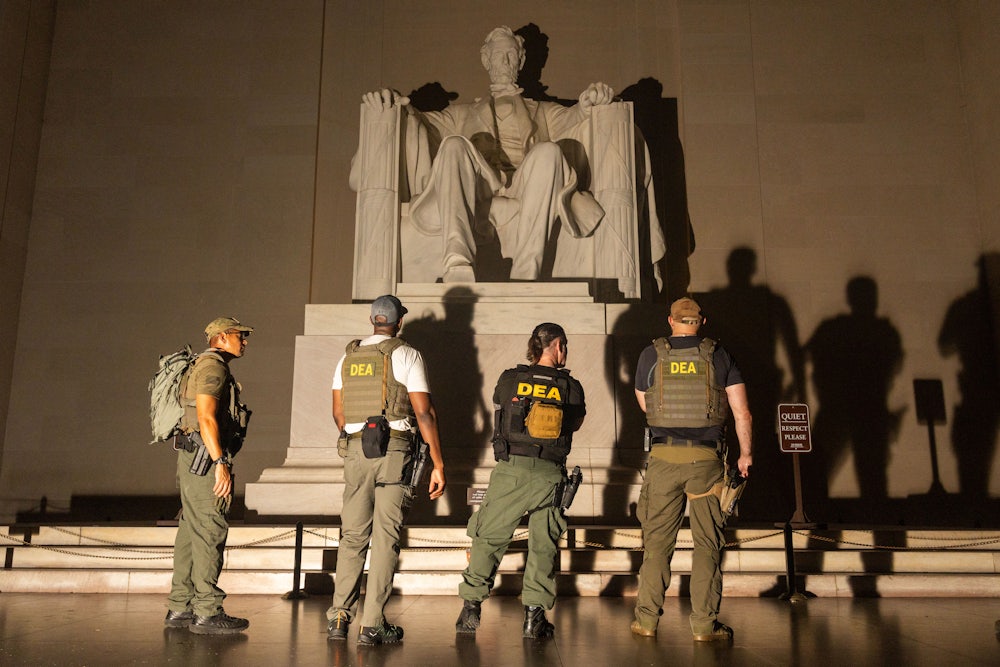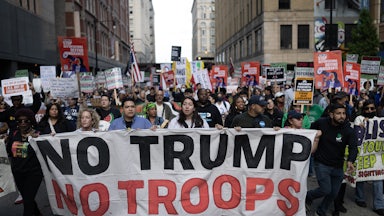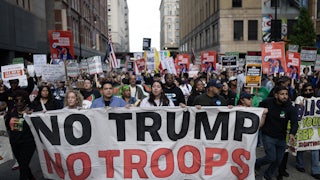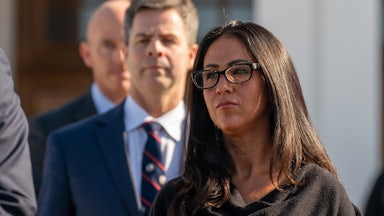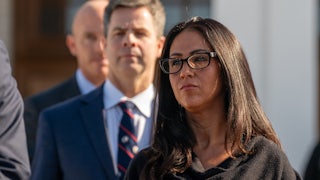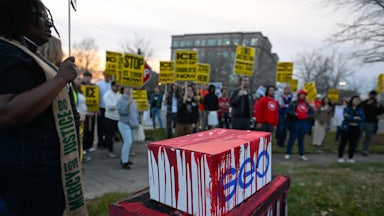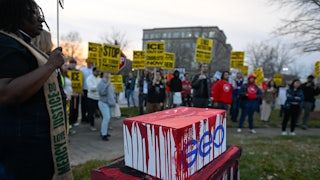January 6, 2021, was the end of Washington, D.C., as a capital city. There was no going back after the political perpetrators of a violent attempt to overthrow the government were never held to account, paving the way for them to take back power. That more than 1,000 violent criminals, charged and convicted for attacking the Capitol at their behest were, four years later, released back into society also did not help. But the terminal blow to the city was that through it all, the residents of the District of Columbia were never fully considered as stakeholders in the attack on our nation’s seat of government, which also happens to be their home.
There are so many indelible images the public could associate with January 6: the Confederate flag outside the Senate chamber, the zipties in the House gallery, “Murder the Media” etched by white nationalists into the building’s doors, excrement on Nancy Pelosi’s desk.
But ultimately none of these publicly available photos and videos are what haunt me most. For nearly a decade, the U.S. Capitol building was my office. It was also the office of my husband, a longtime Senate staffer, for twice as long. And what I think about now when I think about January 6 is one of his former Senate colleagues, a friend of ours, posting after the attack about how she was regularly poring through her boss’s non-classified intelligence reports, checking for active threats to the Senate daycare, one of the only real benefits left for Senate employees.
She was not a national security staffer, but the daycare was where her toddler spent his days as she worked on behalf of the public—essential work that anti-government extremists have vilified to the point that four years later, without vigorous contestation from Democrats or the media, the public has become inured to the idea that it can be erased without impact on our daily lives.
I thought of her this week, as D.C. public schools returned to class, and many of our friends posted photos of smiling-through-lost-teeth kindergarteners, first, and second graders, starting their school years under military occupation. I thought of her last week, when a friend from college posted that her child’s daycare’s end-of-summer picnic in a public park was canceled over fears of an ICE raid. And I thought of her last March, when Senate Democrats caved on a spending bill that not only devastated the social safety net nationwide but also stole $1 billion from Washington, D.C.—including $300 million from D.C.’s public school system. In the lead-up to that vote, I remember desperate posts from some of our friends, with photos of their children, begging their network outside of D.C. to contact their own senators to block the bill that would defund their public preschools because they had no senators representing them who they could call.
While my Instagram feed could be properly characterized as “photos of smiling kids who did not ask for this and deserve better,” my LinkedIn feed for months has been a professional bloodbath of friends, former colleagues, acquaintances, and students—many of whom are the parents of the aforementioned smiling kids who deserve better—who lost their government and government-adjacent jobs, forced out of public service and advocacy with nowhere else in public policy to turn.
There’s no other way to put it: The approximately 700,000 Americans who live in Washington are actual people; they are people with jobs, families, mortgages, commutes, favorite parks and neighborhood bars. They are just like us, with one major exception: They have no voting representation in the United States Congress, which operates at the United States Capitol, which sits at the center of their own city.
Maybe you’ve never thought deeply or cared about the fact that no one can cast a vote on behalf of D.C. residents in the U.S. House or Senate. Maybe you’ve never known about or considered how the District’s government does not have full autonomy like your city or mine, and that Congress, without a delegation representing D.C.’s interests, can exert undue control over D.C.’s budgets and operations. Maybe you think the D.C. license plates of “Taxation Without Representation” are cute little pieces of political paraphernalia slapped on the cars of a bunch of political robots who are more committed to the bit than to their own citizenship.
But now that a lawless president has taken over D.C. streets simply because he does not like anything D.C. represents—symbolically as a place where the federal government is practiced, or literally as an example of vibrant multicultural urban life—I need you to know that what is happening now to the people of the District is devastating, it matters, and it is only the beginning. Washington, D.C., residents are the most powerless canary in the most authoritarian coal mine. And I’m not sure people outside of Washington fully grasp how bad things are, why they should care, or how we got here. It’s never been more urgent to reckon with that’s happening in the nation’s capital, because at some point, Trump will be coming for your home as well.
The condition of mobilized national guards and tanks and tin soldiers filling the streets of Washington is only truly possible to the degree we are seeing because of the unique conservatorship relationship between the federal and D.C. municipal governments, D.C.’s lack of representation in Congress, and its contemporary history as an ideological petri dish for an increasingly extreme Republican party and a bargaining chip for Democrats who never thought their unjust compromises would catch up with them.
These past few weeks I’ve been losing my mind, wondering how this extra-Constitutional infringement at the seat of our government—where so many of our nation’s most influential reporters and politicians live and work—has not been treated as a full-blown crisis, the onset of end times, a red line crossed from which we cannot, as a liberal democracy, return.
It’s all too easy to make Washington, D.C., into an abstraction, a collection of monuments we were raised to see as symbols of democracy as opposed to buildings filled and maintained by humans. Most people who don’t live in D.C. can dissociate, see the talking heads on cable news and feel like, “that’s Washington,” too, without considering that the guests who show up on CNN’s The Situation Room on any given afternoon represent a mere 0.000007 percent of the people who live in the District—and also they probably live in tony homes in the McLean, Virginia suburbs.
I want to make these people real to you because it occurred to me that what Republicans are doing to D.C. residents now is not a scandal now because it is not and was never scandalous that D.C. residents live in the shadow of our federal government without full citizenship rights. We are seeing the natural outgrowth of that fallacy.
When I covered Congress in 2011, and the tea party was on the rise, then-speaker John Boehner and then-president Barack Obama used the rights of District of Columbia residents as a bargaining chip to keep the government open, as a first step in summer-long negotiations that also required separate legislation to prevent an unprecedented default on the nation’s debt.
Obama and Senate Democrats sacrificed the rights of D.C. to avert a federal government shutdown, passing law that restricted the District of Columbia from using its own funds to provide abortion services to low-income residents. The law also prohibited the city from using its own funds for a needle-exchange program. In that same bill, Obama allowed Boehner to test out his favored pet project on D.C.’s children, creating the only federally funded school voucher program that permanently reshaped education in the District without the participation, input, or consent of any public official elected to represent D.C. residents.
I bring this up to provide context on how the vote last March to keep the government open by stealing $1 billion from D.C. was not an outlier but the norm, and to note that Washington, D.C. as a city only can function on the good faith of a federal government empowered to play a paternalistic role in its operations and oversight. This is the crisis.
D.C. residents are Constitutional second-class citizens and what’s happening to them now could happen to those of us who enjoy the full privileges of the Constitution if our elected officials, especially Democrats who should know better, do not start raising hell about the hell that is currently Washington, D.C.
Here is the terrifying truth: D.C. residents, in number, outrank the populations of Vermont and Wyoming. They also are incredibly diverse, with D.C. being a majority-minority city and Black residents comprising more than 40 percent of the city’s total population. But, in geography, they only take up 68 square miles, a space more easily occupied at the whim of a capricious president than say, Los Angeles, a city that takes up almost 470 square miles in a county that takes up more than 4,000.
D.C. residents are trapped, they are vulnerable, and if we ever have a free and fair election again, they need statehood yesterday. We cannot do the necessary work of rebuilding the federal government without a free and functioning city for federal government workers and civic servants to live, without fear or reservation.
So as you continue to see your friends post photos of their smiling kids, holding first day of school signs and articulating their highest hopes for the year ahead, I hope you’ll think of the parents of D.C. and remember, they are just like us—and absent urgent action from our leaders, we could be just like them.
